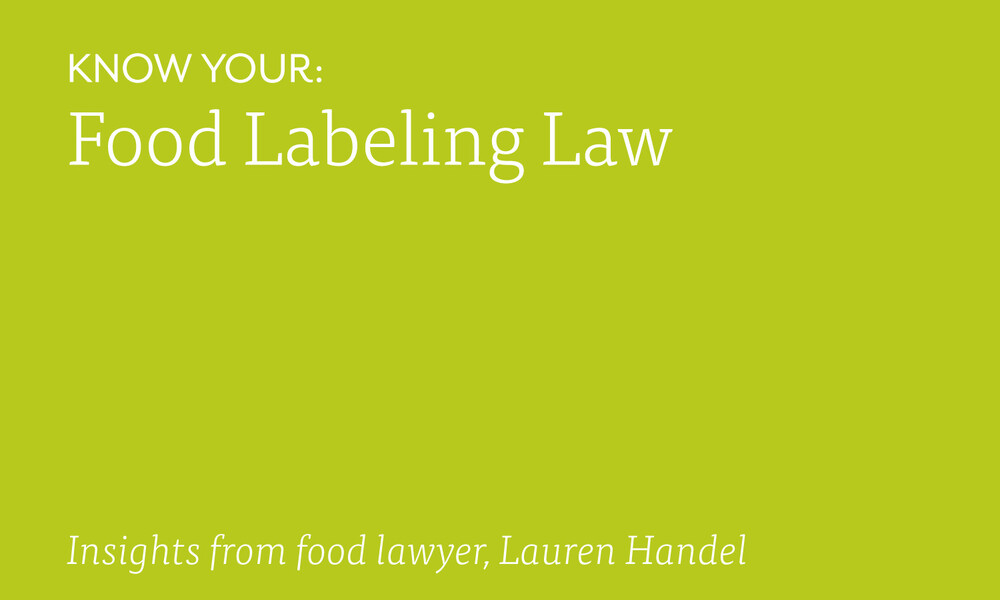
February 25, 2016
Insights from a Food Lawyer: 5 Important Things to Know About Food Labeling Law
We know starting a food business and working on your food packaging design is hard enough as it is. Throw in the added worry about making sure your labels and packaging design are in line with any required regulations, and many food startups are asking for a headache. We've asked our extended Design Womb team member and legal expert, Lauren Handel, who just launched her own firm, to share some helpful insight on what to consider while working on your packaging design and brand's launch.
1. Who regulates food labels in the US?
At the federal government level, food labels are regulated by the US Department of Agriculture (USDA) (for meat, poultry and processed egg products), the Alcohol and Tobacco Tax and Trade Bureau (TTB) (for alcoholic beverages) and the Food and Drug Administration (FDA) (for all other foods). The Federal Trade Commission (FTC) has jurisdiction over advertising, including websites and social media marketing. States also have authority to regulate food labels and marketing.
2. Can you be sued for your food label?
YES! In the last few years, the plaintiffs’ bar has played an increasing role in “regulation” of food labels by bringing hundreds of class action lawsuits against food companies allegedly for deceiving consumers with false or misleading food labels. Foods labeled as “natural” that contain genetically modified, synthetic, or highly-processed ingredients have been the primary target of such lawsuits to date. But the litigation has expanded to other types of allegedly false or misleading food labeling—such as labels using the term “evaporated cane juice” to describe a type of sugar ingredient, labeling claims about antioxidants and “superfood” ingredients, and claims about certain products being healthy or good for you when they contain lots of sugar or fat. Competitors also can sue for unfair competition based on a false or misleading food label.
3. What label claims may be made about health-related benefits of a food product?
It is flatly illegal to claim that a food product can help to treat, cure or mitigate any disease. Such claims may be made only for drugs, which must go through extensive review and approval by FDA before they may be sold. However, it is permissible to claim that a food product helps to support a normal, healthy bodily structure or function (such, as “supports a healthy immune system” or “builds strong bones”) provided that the manufacturer has sufficient scientific evidence to back up the claim.
FDA rules also set conditions for using the terms “healthy,” “health,” and other variants of those words, when used in connection with a claim about the nutrients or ingredients in the food. It is illegal to use those terms if the product contains too much fat, cholesterol or sodium, or if does not contain enough of at least one beneficial nutrient (vitamins A, C, calcium, iron, protein, or fiber).
4. What claims may be made about the nutrition content of food?
FDA regulations govern claims characterizing the level of a nutrient in a food product—for example, “high fiber” or “low fat.” Manufacturers may use only certain terminology in making such claims—such as, “good source,” “high,” and “excellent source.” You may not say that a product is “packed with vitamin C,” for instance. FDA regulations also define how much of each “bad” nutrient is too much for a “low” claim and what minimum amounts of “good” nutrients are needed for a “good source” or “high” claim. In some cases, a manufacturer may make a nutrient content claim only if it also includes an additional disclosure.
5. Can you say things on your website that you cannot say on the product label?
In general, no. If the company’s web address is printed on the package label, FDA considers a website to be part of the product labeling and subject to the same rules as apply to the package label. Other kinds of marketing materials—such as product brochures and sell sheets—also can be considered part of the labeling. FDA also looks at websites (and, potentially, social media) for evidence that a company intends to market a food product as an unapproved drug. And, as mentioned above, the FTC also has jurisdiction over websites and social media. The bottom line is: be careful about claims you make anywhere you market your products.
Bio: Lauren Handel is the principal attorney of Handel Food Law LLC, which exclusively serves farming, food, and alcoholic beverage businesses. Lauren’s practice focuses on regulatory compliance and enforcement matters, commercial contracts, and intellectual property.
Nicole LaFave